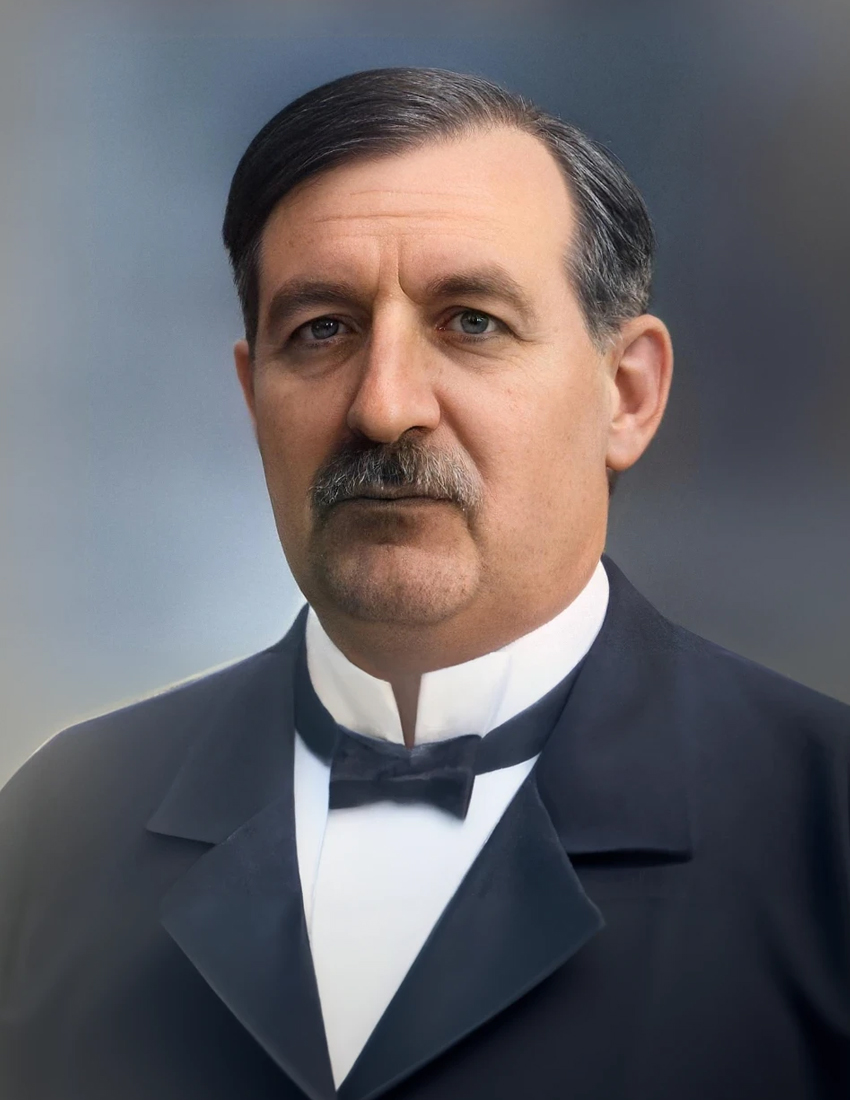Born: April 5, 1850, Towner Hill, Rome, PA.
Died: October 3, 1919, Longwood, MO.
Buried: Rosehill Cemetery, Chicago, IL.
Daniel Brink Towner

Hymns by Daniel Towner
A Life Devoted to Gospel Song
Born on March 5, 1850, in the small town of Rome, Pennsylvania, Daniel Brink Towner would go on to become one of the most influential gospel composers, music directors, and singers of his generation. His legacy continues to resound through the hymns and songs sung in churches around the world today.
Early Years and Musical Training
Daniel Towner was born into a musical family, with a father who was a well-known singer and music teacher in his own right. Prof. J. G. Towner recognized his son’s prodigious talent early on and personally oversaw Daniel’s musical training. Under his father’s tutelage, the young Towner developed a powerful bass voice that would later earn him renown as “the wonderful boy bass.”
As a teenager, Daniel toured throughout Pennsylvania, southern New York, and eastern Ohio, performing in concerts and singing popular bass solos of the day. His rich, resonant voice captivated audiences wherever he went. But Towner’s musical education didn’t stop there. He continued to study under esteemed teachers like John Howard, George Root, and James Webb, honing his craft as a vocalist, conductor, and composer.
A Voice for the Gospel
Though he began his career singing secular music, Towner’s true calling was to use his voice for the glory of God. As he became more involved in church music ministry, he turned his attention to writing and performing gospel songs. His talent caught the eye of none other than the great evangelist D.L. Moody, who invited Towner to join him in his evangelistic campaigns.
Throughout the 1880s and 1890s, Towner traveled with Moody and other prominent preachers like L.W. Munhall and Major D.W. Whittle, leading choirs and congregations in song and singing solos that touched hearts and drew people to Christ. His powerful yet tender voice became an integral part of these revival meetings, a musical testimony to the transforming power of the gospel.
The Story Behind “Trust and Obey”
One of Towner’s most enduring contributions to hymnody is the beloved song “Trust and Obey.” The song’s origins can be traced back to a series of meetings Towner was conducting with Ira Sankey in Brockton, Massachusetts. During a testimony service one evening, a young man stood up and declared, “I’m not quite sure—but I’m going to trust and obey.”
Those simple yet profound words struck a chord with Towner. He jotted them down and sent them, along with the story, to Rev. J.H. Sammis, a Presbyterian minister and friend. Sammis crafted a hymn text around the theme of trusting and obeying God, and Towner supplied the tune. The result was a hymn that perfectly encapsulated the Christian life—a call to surrender to God’s will and walk in obedience to His Word. Since then, “Trust and Obey” has been sung by millions around the world, a testament to the enduring power of Towner’s musical legacy.
The Northfield Conferences: A Gathering Place for Christian Leaders
In the late 19th century, the small town of Northfield, Massachusetts, became the unlikely hub of a vibrant spiritual movement. Thanks to the vision and leadership of evangelist D.L. Moody, who had established schools for boys and girls in the area, Northfield played host to a series of summer conferences that drew Christian leaders and laypeople from across the country and around the world.
These gatherings, known as the Northfield Conferences, were designed to promote spiritual renewal, biblical training, and collaboration among believers. Attendees would participate in Bible studies, hear powerful preaching from renowned speakers, and join in heartfelt worship and prayer. The conferences also provided a space for Christian musicians, like Daniel Towner and George C. Stebbins, to share their gifts and lead others in praise.
A Humorous Moment with Moody and Friends
One amusing anecdote from Towner’s time at the Northfield Conferences, as recounted by his friend and collaborator George C. Stebbins (with whom he co-wrote the gospel song “Saved by Grace”), illustrates the camaraderie among the evangelists and D.L. Moody’s penchant for putting his musical friends to work.
One Sunday morning, Moody had an appointment to preach at a small church a few miles from Northfield. He insisted that Stebbins, Towner, and Ira Sankey accompany him to provide the music. When they arrived at the church, the men filed in one by one: first Moody, then Sankey, then Stebbins, and finally Towner.
As it happened, each man was about two inches taller than the one in front of him, creating a rather comical “stair-step” effect as they made their way to the platform. Moody, at around 5’8″, was the shortest of the bunch, while Towner towered over the rest at well over six feet. The congregation couldn’t help but chuckle at the sight of this “gospel quartet” arranged in perfect height order.
It was a light-hearted moment that revealed the genuine friendship and teamwork among these dedicated men of God. Whether preaching or singing, they were united in their mission to share the good news of Christ far and wide. And if their physical stature provided a bit of comic relief along the way, well, that was just one more way to connect with the people they had come to serve.
A Life of Ministry and Leadership
Throughout his career, Towner served as a music director in several prominent churches, including Centenary Methodist in Binghamton, New York, and Union Methodist Episcopal in Covington, Kentucky. In each of these positions, he led choirs, conducted concerts and conventions, and used his musical gifts to enrich the worship life of the congregations he served.
But perhaps his most significant role came in 1893, when he was appointed as the head of the music department at the Moody Bible Institute in Chicago. In this position, which he held until his death in 1919, Towner helped establish one of the world’s premier training grounds for gospel singers and musicians. His visionary leadership and uncompromising commitment to excellence set a standard that continues to inspire and shape music ministry to this day.
A Legacy That Spans the Globe
Over the course of his remarkable career, Daniel Towner composed music for over 2,000 hymns and gospel songs. His compositions, which include classics like “Trust and Obey,” “At Calvary,” and “Grace Greater Than Our Sin,” have been sung by countless believers around the world. They have brought comfort to the mourning, hope to the downcast, and joy to the redeemed.
Even now, more than a century after his death, Towner’s music continues to inspire and uplift. His songs are still found in hymnals and worship sets across the globe, a living testament to the enduring power of gospel music. Through his tireless efforts as a composer, teacher, and worship leader, Daniel Towner helped shape the sound of Christian music for generations to come.
A Life Poured Out for God’s Glory
Daniel Brink Towner’s life was a shining example of what it means to use one’s talents for the glory of God. From his early days as a touring vocalist to his final years as a beloved music professor and composer, Towner never wavered in his commitment to creating and sharing music that pointed people to Christ.
His legacy is one of faithfulness, excellence, and humble service. He poured out his life in ministry, using his voice and his pen to proclaim the good news of the gospel. And though he is now singing in the heavenly choir, his music lives on, continuing to inspire and encourage believers just as it did during his earthly life.
As we reflect on the life and legacy of Daniel Brink Towner, let us be challenged to use our own gifts and talents for the glory of God. May we, like him, trust and obey, anywhere and everywhere the Lord leads. And may we never underestimate the power of a life fully surrendered to Christ, a life that leaves a legacy of faith, hope, and love. That is the enduring testimony of Daniel Brink Towner, a true servant of the gospel song.

